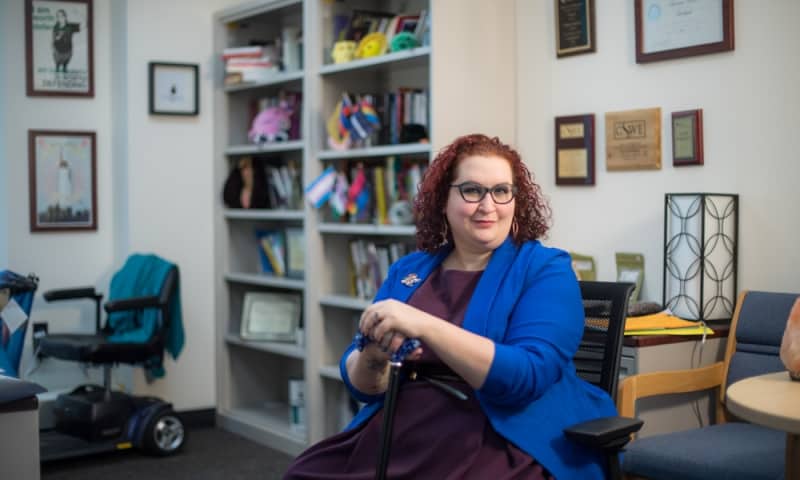
JESSICA LEEDS-RICHMAN, Arts & Life Editor Emeritus — Wearing violet blazers and matching lipstick, Leah Lakshmi Piepzna-Samarasinha and Shanna Katz Kattari commanded attention—even if you had not noticed their disabilities.
Piepzna-Samarasinha identifies as “a queer disabled femme writer, organizer, performance artist and educator of Burgher/Tamil Sri Lankan and Irish/Roma ascent.”
Instead of focusing on the negatives often represented in the media, Piepzna-Samarasinha prefers to think about and reflect upon how she and other disabled people are “living really good disabled lives.”
On Tuesday, Sept. 26, 2019, Piepzna-Samarasinha and Kattari presented the “Disability and Gender Justice Panel” as part of the women’s and gender studies sponsored Laura C. Harris series. The next event in the Laura C. Harris series, “Sex Ed for the Real World: A Conversation with Heather Corinna and Hanne Blank” will take place at 7 p.m. on Thursday, Nov. 7 in the Burton Morgan Lecture Hall.
“Feminists have long been fighting for justice in healthcare and engaging in debates about wellness and health,” said Dr. Clare Jen, chair of the women’s and gender studies program.
“Healthcare justice remains one of the world’s most pressing challenges, with women, children, and the marginalized often disproportionately affected by restricted access to healthcare.”
Piepzna-Samarasinha and Kattari further discussed how healthcare discrimination and ableism play a role in their lives and the lives of so many other disabled femme people.
She talked about how communities are key for people with disabilities and how often that sense of belonging saves more lives than doctors. Note, both Piepzna-Samarasinha and Kattari alternate the terms “disabled people” and “people with disabilities” as one would not say “a person with gayness.” However, different people within the community prefer to identify differently so the pair remain sensitive to these preferences.
Kattari is “a queer, White, Jewish, cisgender, disabled, chronically ill Femme.” She is a board-certified sexologist, certified sexuality educator, social justice advocate, and currently serves as an assistant professor of social work and women’s studies at the University of Michigan.
In building off of Piepzna-Samarasinha’s earlier comments, Kattari added that not only are medical providers ill-prepared to help disabled people, but they are also even less prepared for disabled trans people.
“Chronic fatigue used to be seen as women being too tired from working and having a family,” said Kattari.
“Invisible illnesses”—or as Piepzna-Samarasinha and Kattari prefer “non-apparent illnesses”—such as chronic pain and fatigue are seen as women’s issues and therefore are not taken as seriously in a medical-industrial complex that follows a patriarchal system. The reality is that we cannot assume how someone is feeling based on their outward appearance.
In terms of how to be there and support the disabled people in your life, Piepzna-Samarasinha and Kattari say there is no single answer. It can be anything from offering to bring a friend soup, to community organizing for governmental policy change.
“Access is just the first step,” said Piepzna-Samarasinha. “We are organizing through peril to reach liberation.”
Disabled people aren’t staying hidden; they are fierce, they are in your face, and they are here to stay.

